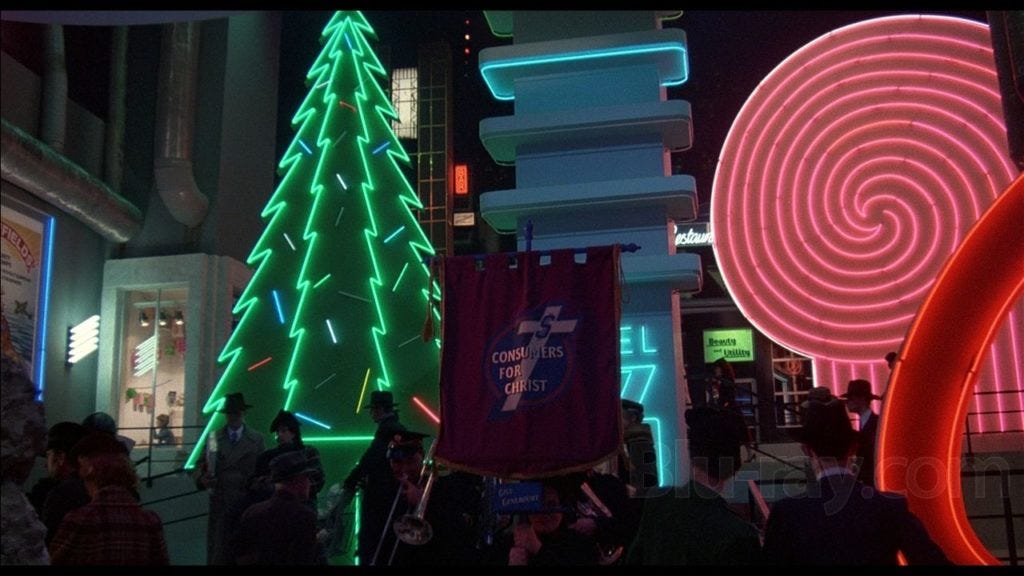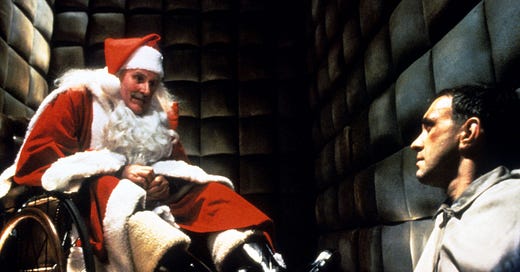
‘Brazil’ Is a Christmas Movie
Terry Gilliam’s junkpunk classic is set during our most dystopian holiday.
There are two certainties in director Terry Gilliam’s 1985 masterpiece Brazil: terror and Christmas.
His vision of tomorrow is bleak and paranoid, a world of endless wars and endless Yuletide cheer. One feeding the other, like a holiday wreath ouroboros. Brazil is a fruitcake of movie genres, combining sci-fi, noir, comedy, and fantasy into one grim loaf. And, like fruitcake, it has a way of sticking to your teeth, sometimes for years. I keep thinking about this movie more and more, especially since America seems to be slowly moving towards a Christmas-based economy. One day, the holiday season will start on December 26th.
The former Monty Python member cleverly updates George Orwell's classic futuristic dystopia Nineteen Eighty-Four to Thatcher’s dreary England. In Brazil, the near future is a mess that combines the worst of socialism and the worst of capitalism. Imagine if Verizon customer service took over the DMV and you needed to fill out a form in triplicate with them to get permission to fix your own air ducts.
Gilliam also manages to improve on Orwell a bit. No doubt co-screenwriter Tom Stoppard, the beloved playwright, helped with that. In Orwell’s novel, Big Brother is all-powerful and, most of all, competent, a police state capable of snuffing out the fires of individuality, no matter how small the flame. But in Brazil, the state is a parade of mistakes made by an army of gutless bureaucrats. Imagine a boot stamping on a human face while that same boot simultaneously slips on a banana peel.
Brazil was a flop when it was released, and its production woes are near legend. Almost Wellesian. Gilliam fought the studio for control over his work and the result is a movie that is sometimes uneven, but almost always interesting, beautiful, and slyly terrifying. It is as prescient now as it was then.
The movie is, like Nineteen Eighty-Four, a cautionary tale. Beware the power of the state and its younger sibling, free enterprise. In both stories, society conspires to crush the human spirit. There is nothing that threatens the status quo more than people thinking they can just follow their hearts, willy-nilly. So, Big Brother watches, and in Gilliam's nightmare, the maître d' does as well. When it comes to tyranny, you know, you can’t make a punch bowl of eggnog without breaking a few eggs.
Brazil isn't about Christmas, exactly, but that doesn't mean it's not a Christmas movie. Christmas lurks in the background. Twinkling holiday lights hang from industrial ducts that snake through rooms and hallways like tentacles. Bombs rip apart department stores filled with holiday shoppers. The sound of sleigh bells ringing is followed by violence. In a cramped apartment, a mother reads A Christmas Carol to her two moppets one moment; the next, government shock troops are kicking down the door and the dad is bagged and tagged, hauled away, a suspected terrorist.
It’s a mistake, of course. A literal bug in the machine.
The only person who doesn't seem permanently delighted by the festiveness is Sam Lowry, played by stammering, rubber-faced legend Jonathan Pryce. Sam is a politically connected, underachieving button-pusher who dreams of a life of adventure and love but has settled for a life of being invisible.
He spends his days resisting promotions set in motion by his mother, a plastic-surgery-addicted power diva played by Katherine Helmond. He doesn’t want a fancy job with a fancy title. Especially if that job would mean hunting down terrorists or anyone who causes any trouble, really, for God, country, and commerce.

Gilliam’s aesthetic is similar to steampunk, only instead of steam-powered technology, Brazil is sci-fi inspired by twentieth-century gadgets, like typewriters and toasters. They’re all clunky or broken. I guess you could call it “junkpunk.” In this hell, paperwork is everything. Receipts are given to the family of the arrested. A transcript of a tortured suspect screaming for mercy printed out on a giant printer. If you don’t have the right form, you can’t do anything in this society.
A single clerical error—that literal bug in the machine—sets the plot in motion. Sam is a bug, too, who gets smashed inside a vast corporate machine. He chooses love over ambition and, I suppose, he gets his heart’s desire in the end, which is to fly in the clouds forever.
In Gilliam’s dystopia, Christmas is purely political. It’s an opiate of the masses. To the elite, it’s a social code. “Happy Christmas” is what rivals say to each other, their smiles sinister rictuses. Orwell’s Party provides the people with everything they need: smokes, gin, pornography. But he also underestimated the people’s desire for merriment and ritual. For stupefying, superficial celebrations of human virtues. And sweets. Gilliam’s commentary is obvious but effective: The true spirit of Christmas isn’t corrupted by just consumerism. No, it is also corrupted by the powerful who use it as a weapon. If I say “Happy Christmas” and you don't say it back does that mean you’re an enemy of the state?
When Sam surprises his friend Jack, played with jolly menace by Michael Palin, at his office, Jack immediately selects one out of six perfectly wrapped Christmas gifts to give to Sam. These gifts are social currency. The old adage goes “it’s the thought that counts” but gifts are given without thought in Brazil. They’re like ancient handshakes between wary knights. A gift that does not explode is a sign of peace.
Sam’s visit isn't friendly either though. He wants information. Jack does help, but only after he takes off scrubs covered in the blood of a prisoner he was interrogating. The last time the two saw each other was at a Christmas party, and Jack knows that Sam has friends in high places.
That is Brazil’s reality, where grinning office drones terrorize the innocent during the day and attend Xmas shindigs at night.
The recent news that a giant Christmas tree was set ablaze by a lunatic outside a cable news network’s New York City offices was a scene straight out of Brazil. Ho, ho, oh no! It was caught on video that then played on a loop on that company’s shows. There is nothing like breaking news delivered to your doorstep. The attack wasn’t targeted but it’s still ironic. That same cable news network is the same that famously, breathlessly, declares a “War on Christmas” every year because it boils the puddings of their loyal geriatric audience. But Brazil is a reminder that when that war is won, it will be won by authoritarians. Happy Christmas, or else.










